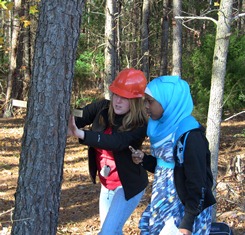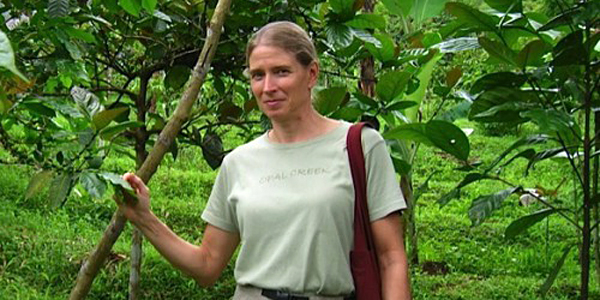Environmental education programs that took middle school students outdoors to learn helped minority students close a gap in environmental literacy, according to research from North Carolina State University.

Students at Centennial Middle School in Raleigh, NC learn about tree measurement
The study, published March 22 in PLOS ONE, showed that time outdoors seemed to impact African-American and Hispanic students more than Caucasian students, improving minority students’ ecological knowledge and cognitive skills, two measures of environmental literacy. The statewide study also measured environmental attitudes and pro-environmental behavior such as recycling and conserving water. “We are interested in whether outdoor experiences can be part of a catch-up strategy that can help in narrowing the environmental literacy gap for minority students,” said lead author Kathryn Stevenson, an NC State graduate student who has taught outdoor education classes in California and high school biology and science in North Carolina.Researchers tested the environmental literacy of sixth- and eighth-grade students in 18 North Carolina schools in the fall and spring. Half of the schools studied had registered an environmental education program with the state.Using a published environmental curriculum, such as Project Learning Tree, Project WET or Project WILD, helped build students’ cognitive skills, researchers found. Learning in an outdoor environment improved students’ ecological knowledge, environmental attitudes and behavior.
“This is one of the first studies on a broad scale to focus on environmental literacy, which is more than mastering facts,” said co-author Nils Peterson, associate professor of fisheries and wildlife in NC State’s College of Natural Resources. “Being environmentally literate means that students learn cognitive skills so that they can analyze and solve problems, and it involves environmental attitudes and behaviors as well.”
Girls and boys appeared to have complementary strengths that contributed to environmental literacy. Boys scored highest on knowledge, while girls led in environmental attitudes and cognitive skills.
Sixth graders showed greater gains in environmental literacy than eighth graders, suggesting that early middle school is the best window for environmental literacy efforts, Stevenson said.
Teachers’ level of education played an important role in building environmental literacy. Those with a master’s degree had students with higher levels of overall environmental literacy.
Teachers who had spent three to five years in the classroom were more effective at building students’ cognitive skills than new teachers. Efforts are needed to engage veteran teachers in environmental education, Stevenson said.
In a follow-up to the study, Stevenson is studying coastal North Carolina students’ perceptions of climate change.
– ford –
Resources: Environmental Literacy Fact Sheet
Note: An abstract of the paper follows.
“Environmental, Institutional, and Demographic Predictors of Environmental Literacy among Middle School Children”
Authors: Kathryn T. Stevenson, M. Nils Peterson, Howard D. Bondell, Angela G. Mertig and Susan E. Moore
Published: March 22, 2013, in PLOS ONE
Abstract: Building environmental literacy (EL) in children and adolescents is critical to meeting current and emerging environmental challenges worldwide. Although environmental education (EE) efforts have begun to address this need, empirical research holistically evaluating drivers of EL is critical. This study begins to fill this gap with an examination of school-wide EE programs among middle schools in North Carolina, including the use of published EE curricula and time outdoors while controlling for teacher education level and experience, student attributes (age, gender, and ethnicity), and school attributes (socio-economic status, student-teacher ratio, and locale). Our sample included an EE group selected from schools with registered school-wide EE programs, and a control group randomly selected from NC middle schools that were not registered as EE schools. Students were given an EL survey at the beginning and end of the spring 2012 semester. Use of published EE curricula, time outdoors, and having teachers with advanced degrees and mid-level teaching experience (between 3 and 5 years) were positively related with EL whereas minority status (Hispanic and black) was negatively related with EL. Results suggest that school-wide EE programs were not associated with improved EL, but the use of published EE curricula paired with time outdoors represents a strategy that may improve all key components of student EL. Further, investments in teacher development and efforts to maintain enthusiasm for EE among teachers with more than 5 years of experience may help to boost student EL levels. Middle school represents a pivotal time for influencing EL, as improvement was slower among older students. Differences in EL levels based on gender suggest boys and girls may possess complementary skills sets when approaching environmental issues. Our findings suggest ethnicity related disparities in EL levels may be mitigated by time spent in nature, especially among black and Hispanic students.
Media Coverage:
RedOrbit
Newswise
CHANS-Net
Phys.org
KPCC, Southern California Public Radio
 Climate Change Adaptation for States, Tribes and Local Governments –
Climate Change Adaptation for States, Tribes and Local Governments –

 The lecture, cosponsored by the College of Natural Resources and the College of Agriculture and Life Sciences, was part of a week of festivities celebrating Earth Day. The following is an excerpt from an article in the student newspaper.
The lecture, cosponsored by the College of Natural Resources and the College of Agriculture and Life Sciences, was part of a week of festivities celebrating Earth Day. The following is an excerpt from an article in the student newspaper.

